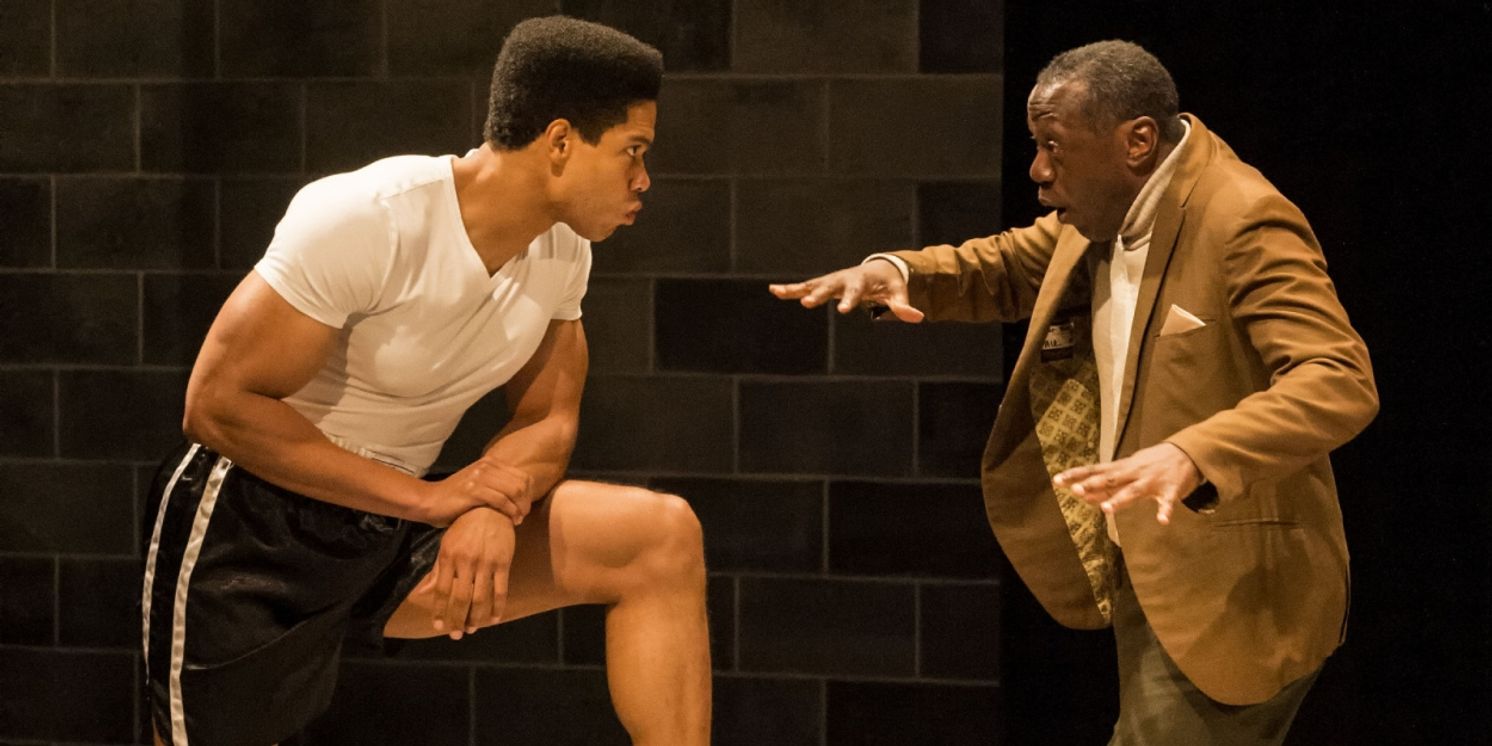Review: FETCH CLAY, MAKE MAN at Kirk Douglas Theatre
The champ and a controversial actor duke it out

In FETCH CLAY, MAKE MAN, when people address Stepin Fetchit, the well-known (if infamous) movie actor of the 1930s, they tend to use his whole name and lace it with a dollop of snide, as if no legitimate human creature should be walking around with that name. We do ultimately hear Fetchit called by his real name, which is Lincoln Perry. Once or twice, he is even ironically and respectfully hailed as Mr. Fetchit. Muhammad Ali mostly just calls him Step.
That’s right, Ali, who in 1965 was fast on his ascent to cementing his reign as the heavyweight champ and one of the greatest athletes of all time when he struck up an unlikely friendship with Fetchit. Ali was looking for some dope on mutual friend Jack Johnson that he could use in his upcoming title defense against Sonny Liston. Fetchit, who had become a millionaire by playing a series of lazy, shiftless Black characters on scren, was seeing his movie work dry up and was only too happy to join the champ’s training camp and maybe get a bit of an image makeover. A stranger symbiosis there never was.
Playwright Will Power investigates this friendship as a fascinating dual study in individual character and cultural identity as well as a look at the social politics of the 1960s. Under Debbie Allen’s rocking direction at the Douglas, FETCH CLAY, MAKE MAN is as exciting as it is thoughtful. THE BEAR’s Edwin Lee Gibson and Ray Fisher act the daylights out of it.
The play begins, as it ends, with Fetchit, enacting a snippet from one of his movie personas who is trying to figure out how to do the least amount of work for his white boss while still collecting his pay. Gibson, smartly dressed throughout in a blazer over a turtleneck, doesn’t initially give away whether the Fetchit schtick is actually his power game or whether Fetchit is now bowing and scraping his way through life because he knows nothing else, and because doing so keeps the waters calm. The pitch of Gibson’s voice changes depending on the year, the circumstance and who he is addressing. Certainly, during a flashback as Fetchit is negotiating a new deal with studio mogul William Fox (Bruce Nozick), it becomes abundantly clear that Perry, Fetchit or whoever is pulling the strings is no dummy.
Nonetheless, in 1965, when he is summoned to a meeting with Ali, the appetite for Fetchit’s persona is on the outs. Ali’s advisor, Brother Rashid (Wilkie Ferguson III), barely conceals his contempt. At that first meeting, Ali is no more welcoming, berating Fetchit and then dismissing Rashid so he can beat the stuffings out of this disgrace of a man in private. But Ali is a trickster, and he is very good at messing with people.
In fact, he’s a lot of things. Newly converted to Islam and with handlers like Brother Rashid watching him closely, the former Cassius Clay is a force of nature. Behind the mic, interacting with friends or banging away at the punching bag, Ali swaggers, bloviates and preens, making everything about Muhammad Ali. An impressive physical specimen as well as a magnetic actor, Fisher (who has played the role before) wears Ali’s “I am the greatest” mantle like a second skin. At rest or in motion, you can not take your eyes off him.
Unless, that is, the action is shifting to Gibson’s Stepin Fetchit who can quietly seize the spotlight all on his own. For all his braggadocio, Muhammad Ali is still only 23 in 1965, and still every bit a work in progress, seeking personal, spiritual and professional validations, the latter of which Fetchit may be able to help him unlock. Fetchit could most certainly use a renaissance, and he is more than happy to hang around Ali’s starry circle, get some mic time and – who knows? - maybe even convince the champ to make a movie with him. And while he’s in the vicinity, he’ll even give some personal advice to Ali’s wife, Sonji (an enticing Alexis Floyd) who is struggling with some of the dictates that come with being a Nation of Islam wife. Fetchit basically counsels her to be herself, advice from which every person in FETCH CLAY, MAKE MAN would benefit.
Ferguson is strong and plenty convincing as Brother Rashid, the handler whose counseling of Ali may have more than a tinge of self-interest. As a Jew who had to work his way up the power structure of the studio system, William Fox should “get” what Fetchit is all about. Eschewing oil, Nozick gives the man a refreshing honesty. Sonji may have some more difficulty negotiating the world that being Muhammad Ali’s wife requires, but Floyd’s performance suggests this lady will either figure it out or else will make a life for herself without being married to the greatest in the world.
Which basically leaves most of the play’s heavy lifting to Muhammad Ali and Stepin Fetchit and that’s as it should be. Power sets up these two very different men as allies, and perhaps unconscious adversaries, but it’s never entirely clear whose side we are supposed to take, if any. In one corner, Edward Gibson plays a man who compromised his way to greatness, and is on his way down. In the other corner, Fisher is Muhammad Ali’s, a supernova of a man at the start of his meteoric ascent.
Battle or no, the winner, thankfully, is the audience.
FETCH CLAY, MAKE MAN plays through July 16 at the Kirk Douglas Theatre.
Photo of Edward Lee Gibson and Ray Fisher by Craig Schwartz
Reader Reviews
Videos

